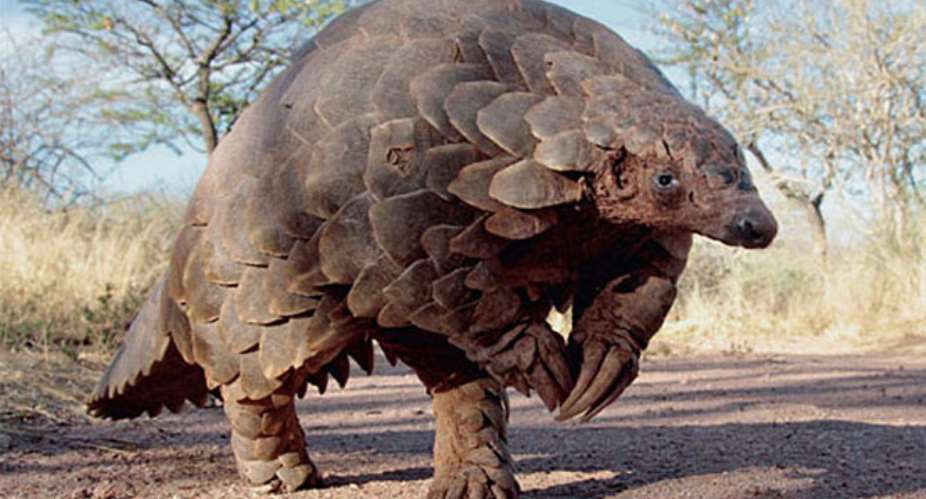12 May 2020: As the world grapples with the effects of coronavirus, World Animal Protection has today launched a campaign calling for an end to wildlife trade. The campaign targets G-20 leaders to support a permanent wildlife trade ban to protect wildlife and prevent future zoonotic pandemics.
The campaign comes in the wake of new research which seems to suggest that coronavirus may have come from wild animals.
The origins of coronavirus are thought to have originated from a wet market in Wuhan, China, where wild animals were sold. Science suggests the virus came from bats, and moved to humans via an intermediary animal, potentially a pangolin – a scaly anteater like animal and most illegally traded mammal in the world.
Tennyson Williams, Country Director at World Animal Protection says:
“Cruel multi-billion-dollar businesses have been exploiting wild animals on an industrial global scale and we are now all seeing the true cost of that. This pandemic isn’t just about wild animals being sold for food. It’s much bigger than that, it’s about greed and the commodification of wild animals at every level.
“We urgently need to persuade the G20 to take steps towards implementing a global wildlife ban to protect us from future pandemics. There is need for a coordinated, global action and this ban could save the lives of millions of people, animals and our economies.”
“If we learn anything from this situation, it is that we need to leave wild animals where they belong, in the wild. We all have a responsibility to make a shift in our behaviour and attitudes towards animals that could save the lives of millions of people, animals and our economies.
“If we don’t purchase exotic pets or traditional medicine that contains wild animal products, and don’t visit venues with performing animals, we will send a clear message that wildlife cruelty is no longer tolerable – for the animals, our health and the planet.
World Animal Protection has a strong track record of supporting local communities to transition away from incomes based on wildlife cruelty. It’s urgent that we come together now to implement a comprehensive wildlife trade ban to eliminate threats of future pandemics to our health and economies.
Join us and call for world leaders to end the global trade of wild animals.
·Check out the Animal Protection Index – an interactive tool that ranks 50 countries worldwide on how well their legislation protects animals.
Traditional medicine
- The demand for traditional medicine has devastating consequences for many species of wildlife traded globally, including bears who are poached and farmed for their bile, which we investigated in our recent report ‘Cruel Cures’.
Exotic pets
- Each year, millions of wild animals are captured from their natural habitats and bred in cruel captive conditions to be traded around the world as pets.
- Our report ‘Wild at Heart’ exposed the suffering involved with the poaching of African grey parrots - some estimates report that 66% of African grey parrots die before they even reach international transit.
Wild animals in tourism
- Approximately 11 million people each year pay to watch elephants perform tricks in Thailand, and 46 million people have paid to see dolphins at a venue at least once in the last 4 years.
- Prices of elephants used for rides have sky-rocketed to over $50,000, and a single dolphin can generate anything between $400,000 and $2 million per year for entertainment venues such as, SeaWorld.





 Election 2024: Ghanaians will vote to erase Akufo-Addo’s horrifying legacy – Nii...
Election 2024: Ghanaians will vote to erase Akufo-Addo’s horrifying legacy – Nii...
 BP killed ex-Weija-Gbawe MCE – Tina Mensah reveals
BP killed ex-Weija-Gbawe MCE – Tina Mensah reveals
 Limited voter registration exercise: NDC slams EC over mass technical challenges
Limited voter registration exercise: NDC slams EC over mass technical challenges
 UK, America will one day come to Ghana to borrow Akufo-Addo to be their presiden...
UK, America will one day come to Ghana to borrow Akufo-Addo to be their presiden...
 EOCO returns fire at OSP over Cecilia Abena Dapaah’s money laundering case
EOCO returns fire at OSP over Cecilia Abena Dapaah’s money laundering case
 Anti-corruption endeavours must be rooted in systems, investigations and prosecu...
Anti-corruption endeavours must be rooted in systems, investigations and prosecu...
 We’ve not introduced 1% cybersecurity levy on banking transactions – BoG
We’ve not introduced 1% cybersecurity levy on banking transactions – BoG
 EU hits out at sidelining of Chad election observers
EU hits out at sidelining of Chad election observers
 ‘Be calm; we’re having engagements on new fee implementation’ — KNUST SRC assure...
‘Be calm; we’re having engagements on new fee implementation’ — KNUST SRC assure...
 Bawumia is compassionate, unique politician without corruption tag — Miracles Ab...
Bawumia is compassionate, unique politician without corruption tag — Miracles Ab...
